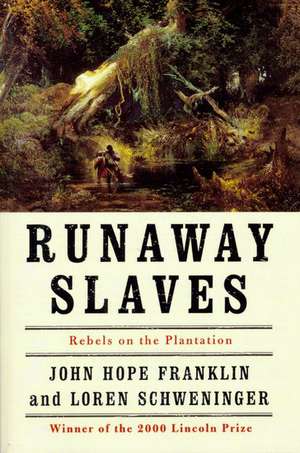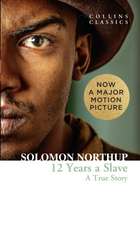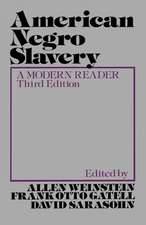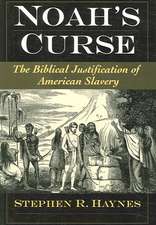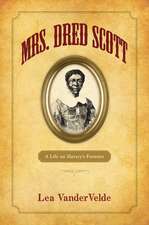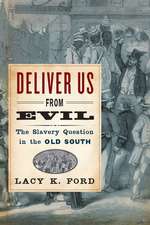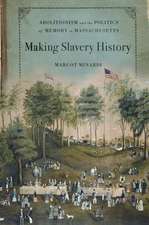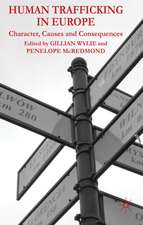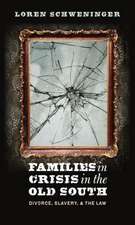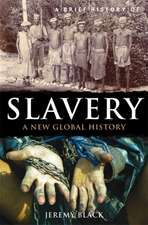Runaway Slaves: Rebels on the Plantation
Autor John Hope Franklin, Loren Schweningeren Limba Engleză Paperback – 24 aug 2000
| Toate formatele și edițiile | Preț | Express |
|---|---|---|
| Paperback (1) | 120.09 lei 31-37 zile | |
| Oxford University Press – 24 aug 2000 | 120.09 lei 31-37 zile | |
| Hardback (1) | 568.49 lei 31-37 zile | |
| Oxford University Press – 5 aug 1999 | 568.49 lei 31-37 zile |
Preț: 120.09 lei
Preț vechi: 130.59 lei
-8% Nou
Puncte Express: 180
Preț estimativ în valută:
22.98€ • 24.16$ • 18.99£
22.98€ • 24.16$ • 18.99£
Carte tipărită la comandă
Livrare economică 05-11 aprilie
Preluare comenzi: 021 569.72.76
Specificații
ISBN-13: 9780195084511
ISBN-10: 0195084519
Pagini: 480
Ilustrații: 15 halftones
Dimensiuni: 157 x 236 x 30 mm
Greutate: 0.75 kg
Ediția:Revised
Editura: Oxford University Press
Colecția OUP USA
Locul publicării:New York, United States
ISBN-10: 0195084519
Pagini: 480
Ilustrații: 15 halftones
Dimensiuni: 157 x 236 x 30 mm
Greutate: 0.75 kg
Ediția:Revised
Editura: Oxford University Press
Colecția OUP USA
Locul publicării:New York, United States
Recenzii
"[The authors] address the meaning of slave flight by inspecting hundreds, perhaps thousands, of cases gleaned from a careful reading of runaway advertisements and judicial and legislative records. Their close analysis reveals that flight was not a single phenomenon but many, because runaway slaves had different motives, strategies, tactics, and goals....[This book] not only tells the story of the minority who secured freedom and attacked slavery from the outside, but how even those who failed to gain their liberty subverted slavery from the inside. In unfolding the fugitives' tale, Franklin and Schweninger contribute mightily to our understanding of how the system of slavery stood for nearly three centuries and why it eventually fell."--Ira Berlin, Los Angeles Times Book Review (Chosen as a Best Book of 1999)
"Assiduous researchers, [the authors] have catalogued and categorized in a 'Runaway Slave Database' a wealth of information, which they impart extensively in their book."--Benjamin Schwarz, The New York Times Book Review
"Thoreau said that historians show us the present more than the past, and nothing illustrates his statement better than [this book]....Runaway Slaves is a formidable corrective [that] tells us more than we want to know about ourselves."--Kent Gramm, Civil War Book Review
"[This] should be on the shelf of any person who has an interest in Southern history or black history, and it certainly will be useful in the classroom."--The Times (Roanoke, Virginia)
"An excellent book, the best available on the struggle between slaves and their masters."--John David Smith, The News & Observer (Raleigh, North Carolina)
"By repetitive and relentless example, Runaway Slaves gathers force: the book is monumental in impact....What emerges is a picture of powerful human resistance--and of a political and economic system rotten to the core."--Phyllis Eckhaus, n These Times
"In this rich, descriptive volume, based on considerable archival research...one of this country's most distinguished historians...collaborates with one of his former students...to get at the true nature of salvery in the Old South by examining the significant number of slaves who by running away challenged the system."--Robert L. Paquatte, The Washington Times
"Runaway Slaves provides an arsenal of ammunition to prove that the Old South was indeed a war zone....[It] amply documents the prevalence and variety of slave rebelliousness."--Arkansas Democrat-Gazette
"An amazing wealth of detail on the backgrounds and experiences of bondsmen and bondswomen who were so discontented with slavery, or at least with their particular experience of it, that they simply ran away....Franklin and Schweninger argue convincingly that more than 50,000 (a conservative estimate) took flight each year....Numbers aside, what is impressive about these runaways is their sheer variety. Again and again, the authors offer a generalization--for instance, that young men were over-represented--and then swamp us with counter-examples....Many different kinds of men and women appear, but none who is docile, or cowed, or content."--John Shelton Reed, Times Literary Supplement
"What a treat to read the engrossing, indeed astonishing, new book by John Hope Franklin and Loren Schweninger! Runaway Slaves: Rebels on the Plantation, 1790-1860 is destined to be a classic and will undoubtedly be well-received by the academic community and general readers alike. The scholarship is truly impressive and it is written in such accessible prose. This book should be on assigned reading lists for as long as we teach American History."--Darlene Clark Hine, co-author A Shining Thread of Hope: The History of Black Women in America
"Meticulous, compassionate, and illuminating; John Hope Franklin and Loren Schweninger in Runaway Slaves have bequeathed to all Americans a modern masterpiece about White power, domination and resistance, and the Black will to be free."--Darlene Clark Hine, co-author, A Shining Thread of Hope: The History of Black Women in America
"By any manner of reckoning John Hope Franklin and Loren Schweninger have produced an extraordinary book about slavery that addresses, authoritatively and persuasively, the basic nature of the slave system....The overwhelming evidence presented in this richly detailed study should dispel, once and for all, the notion that runaway slaves were mere aberrations and that the slave South was a tranquil society inhabited by benevolent white masters and happy, loyal, good-natured blacks contented with their lots as slaves."--Willard B. Gatewood, Alumni Distinguished Professor of History, University of Arkansas, Fayetteville
"A neglected dimension of slavery has finally been researched and revealed in full. An important study by one of the nation's major historians."--Sterling Stuckey, Professor of History, University of California, Riverside
"This splendid book, full of human-interest accounts of escaped slaves, does more than demonstrate the prevalence of slave resistance by running away. By reflecting a bright, harsh light on the institution of bondage, Runaway Slaves expands our knowledge and understanding of slavery in the United States."--James M. McPherson, Professor of History, Princeton University, and author of Battle Cry of Freedom
"Dr. John Hope Franklin and his colleague, Dr. Loren Schweninger, in writing this book have added a tremendous new dimension to our understanding of what slave life was really like in the American South. It does not cause one to lie down to pleasant dreams."--William F. Winter, Attorney, member of President Clinton's Race Initiative Advisory Board
"A well-crafted and carefully researched account that opens a new window onto a dark and painful chapter in American history."--Kirkus Reviews
"Scrupulously detailed."--Library Journal
"Using documentation from broadsheets to diaries, the authors provide incredible details of who the runaways were, their motivations and destinations, and how their efforts failed or succeeded. Franklin and Schweninger provide very personal accounts, giving names and personalities to an aspect of U.S. slavery that is seldom portrayed and refuting the mythology of the contented slave."--Booklist
"An important new book.... Runaway Slaves compellingly documents the perseverance of thousands of African Americans who fought to be free."--Amy J. Kinsel, Seattle Times/Post Intellegencer
"Provides an arsenal of ammunition to prove that the Old South was a war zone.... The best book available on the struggle between slaves and their owners."--John David Smith, Columbus Ohio Dispatch
"Assiduous researchers, [the authors] have catalogued and categorized in a 'Runaway Slave Database' a wealth of information, which they impart extensively in their book."--Benjamin Schwarz, The New York Times Book Review
"Thoreau said that historians show us the present more than the past, and nothing illustrates his statement better than [this book]....Runaway Slaves is a formidable corrective [that] tells us more than we want to know about ourselves."--Kent Gramm, Civil War Book Review
"[This] should be on the shelf of any person who has an interest in Southern history or black history, and it certainly will be useful in the classroom."--The Times (Roanoke, Virginia)
"An excellent book, the best available on the struggle between slaves and their masters."--John David Smith, The News & Observer (Raleigh, North Carolina)
"By repetitive and relentless example, Runaway Slaves gathers force: the book is monumental in impact....What emerges is a picture of powerful human resistance--and of a political and economic system rotten to the core."--Phyllis Eckhaus, n These Times
"In this rich, descriptive volume, based on considerable archival research...one of this country's most distinguished historians...collaborates with one of his former students...to get at the true nature of salvery in the Old South by examining the significant number of slaves who by running away challenged the system."--Robert L. Paquatte, The Washington Times
"Runaway Slaves provides an arsenal of ammunition to prove that the Old South was indeed a war zone....[It] amply documents the prevalence and variety of slave rebelliousness."--Arkansas Democrat-Gazette
"An amazing wealth of detail on the backgrounds and experiences of bondsmen and bondswomen who were so discontented with slavery, or at least with their particular experience of it, that they simply ran away....Franklin and Schweninger argue convincingly that more than 50,000 (a conservative estimate) took flight each year....Numbers aside, what is impressive about these runaways is their sheer variety. Again and again, the authors offer a generalization--for instance, that young men were over-represented--and then swamp us with counter-examples....Many different kinds of men and women appear, but none who is docile, or cowed, or content."--John Shelton Reed, Times Literary Supplement
"What a treat to read the engrossing, indeed astonishing, new book by John Hope Franklin and Loren Schweninger! Runaway Slaves: Rebels on the Plantation, 1790-1860 is destined to be a classic and will undoubtedly be well-received by the academic community and general readers alike. The scholarship is truly impressive and it is written in such accessible prose. This book should be on assigned reading lists for as long as we teach American History."--Darlene Clark Hine, co-author A Shining Thread of Hope: The History of Black Women in America
"Meticulous, compassionate, and illuminating; John Hope Franklin and Loren Schweninger in Runaway Slaves have bequeathed to all Americans a modern masterpiece about White power, domination and resistance, and the Black will to be free."--Darlene Clark Hine, co-author, A Shining Thread of Hope: The History of Black Women in America
"By any manner of reckoning John Hope Franklin and Loren Schweninger have produced an extraordinary book about slavery that addresses, authoritatively and persuasively, the basic nature of the slave system....The overwhelming evidence presented in this richly detailed study should dispel, once and for all, the notion that runaway slaves were mere aberrations and that the slave South was a tranquil society inhabited by benevolent white masters and happy, loyal, good-natured blacks contented with their lots as slaves."--Willard B. Gatewood, Alumni Distinguished Professor of History, University of Arkansas, Fayetteville
"A neglected dimension of slavery has finally been researched and revealed in full. An important study by one of the nation's major historians."--Sterling Stuckey, Professor of History, University of California, Riverside
"This splendid book, full of human-interest accounts of escaped slaves, does more than demonstrate the prevalence of slave resistance by running away. By reflecting a bright, harsh light on the institution of bondage, Runaway Slaves expands our knowledge and understanding of slavery in the United States."--James M. McPherson, Professor of History, Princeton University, and author of Battle Cry of Freedom
"Dr. John Hope Franklin and his colleague, Dr. Loren Schweninger, in writing this book have added a tremendous new dimension to our understanding of what slave life was really like in the American South. It does not cause one to lie down to pleasant dreams."--William F. Winter, Attorney, member of President Clinton's Race Initiative Advisory Board
"A well-crafted and carefully researched account that opens a new window onto a dark and painful chapter in American history."--Kirkus Reviews
"Scrupulously detailed."--Library Journal
"Using documentation from broadsheets to diaries, the authors provide incredible details of who the runaways were, their motivations and destinations, and how their efforts failed or succeeded. Franklin and Schweninger provide very personal accounts, giving names and personalities to an aspect of U.S. slavery that is seldom portrayed and refuting the mythology of the contented slave."--Booklist
"An important new book.... Runaway Slaves compellingly documents the perseverance of thousands of African Americans who fought to be free."--Amy J. Kinsel, Seattle Times/Post Intellegencer
"Provides an arsenal of ammunition to prove that the Old South was a war zone.... The best book available on the struggle between slaves and their owners."--John David Smith, Columbus Ohio Dispatch
Notă biografică
John Hope Franklin is James B. Duke Professor of History, Emeritus, at Duke University. He is a recipient of the Presidential Medal of Freedom, and the author of numerous books, including the epic From Slavery to Freedom: A History of Negro Americans, which boasts more than three million copies in print. Loren Schweninger is Professor of History at the University of North Carolina, Greensboro.
